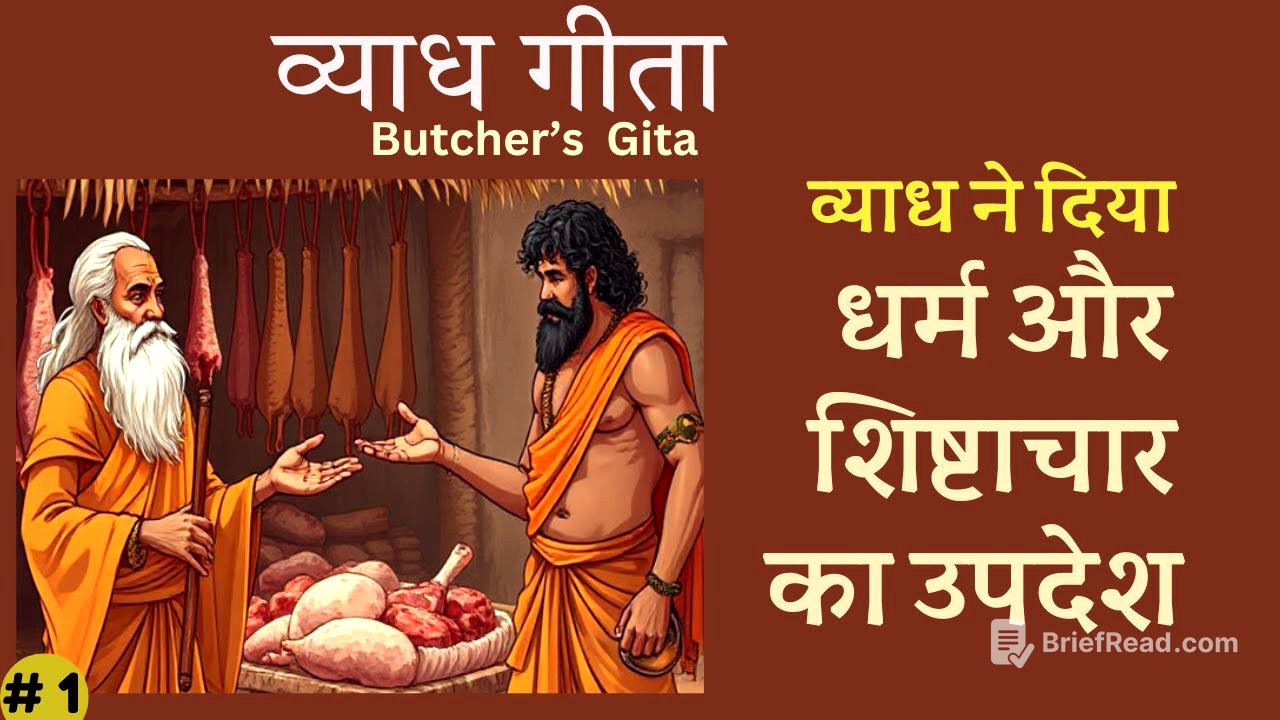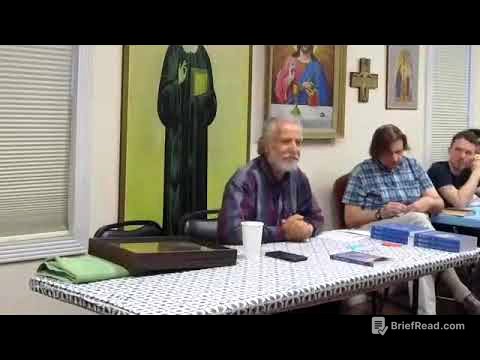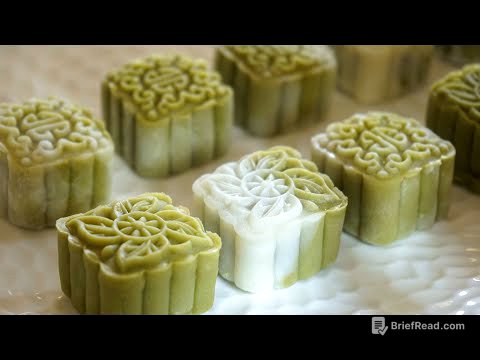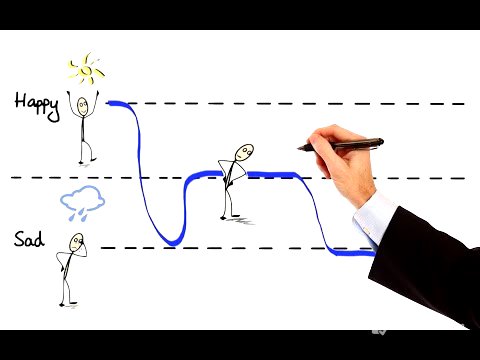TLDR;
This video summarizes a story from Hindu scriptures about a Brahmin named Kaushik who learns valuable lessons about true religion and righteousness. Key takeaways include:
- True religion lies not only in knowledge but also in restraint, truth, and service.
- Anger is a significant obstacle to spiritual progress.
- Dharma is best practiced by fulfilling one's duties and showing kindness to all beings.
- Etiquette and good conduct are essential aspects of a virtuous life.
Kaushik's Encounter with the Bird and the Devoted Woman [0:03]
Kaushik, a learned Brahmin, kills a bird in anger and feels remorse. He goes to beg for alms and is kept waiting by a devoted woman who prioritizes serving her husband. Kaushik gets angry, but the woman calmly tells him that her husband is her supreme deity and true Brahmins control their senses and follow truth. She directs him to Dharma Vyadha in Mithilapuri for further learning. Kaushik realizes that true religion involves restraint, truth, and service, not just knowledge. The woman asks for forgiveness if she made any mistake in her words. Kaushik acknowledges the benefit of her rebuke and takes his leave, filled with remorse and awakened faith.
Kaushik's Journey to Dharma Vyadha [2:56]
Kaushik travels to Mithilapuri to find Dharma Vyadha, as instructed by the woman. He asks people for Dharmavyadh's address and eventually finds him in a slaughterhouse, selling meat. Dharma Vyadha greets Kaushik respectfully, knowing about the woman's message and the purpose of Kaushik's visit. The Brahmin is surprised that the Vyadh knows about him. Vyadh invites Kaushik to his beautiful house.
Dharma Vyadha's Teachings on Dharma [5:27]
At his house, Dharma Vyadha honors Kaushik. Kaushik expresses distress over Vyadha's profession of selling meat, but Vyadha explains that it is his ancestral dharma. He diligently serves his parents, speaks the truth, avoids criticism, and donates according to his capacity. He sustains himself with what remains after feeding gods, guests, family, and servants. Vyadha emphasizes that individuals face the consequences of their actions. He then describes the duties of Brahmins, kings, and other varnas, highlighting King Janak's righteous rule in Mithila.
Dharma Vyadha's Explanation of His Actions and Virtues [9:17]
Dharma Vyadha clarifies that he doesn't harm any living being himself but sells the meat of animals killed by others and never eats meat himself. He only engages in sexual intercourse when his wife's period arrives, fasts during the day, and eats at night. He notes that even those who lack modesty or are addicted to violence can become virtuous. He speaks about the consequences of unrighteous kings, which include caste discrimination and the birth of people with deformities. He praises King Janak for his righteous perspective and kindness towards his subjects.
Qualities for Progress and Avoiding Evil [10:56]
Dharma Vyadha says that he keeps both those who praise and criticize him satisfied with his good behavior. He says that those who remain united in Dharma, do not use anything belonging to others and always exercise restraint over their senses, are the ones who are capable of progress. He advises giving food to others according to their capacity, enduring hardships, remaining committed to Dharma, and revering all beings. He emphasizes the importance of truthfulness, benevolence, and not abandoning Dharma. He advises against repeating mistakes, engaging in beneficial work, and behaving well with everyone, even those who treat you badly.
The Nature of Sin and Virtue [12:52]
Dharma Vyadha describes harming others as the work of sinful men. He criticizes those who mock noble men and appear righteous but are faithless. He says that the best of men are humble, and the thoughts of arrogant men are futile. He advises against criticizing others and praising oneself. He explains that repenting with a true heart frees one from sin and resolving not to repeat the sin prevents future sins. He says that one can be freed from sin by performing any scripturally prescribed act like chanting, penance, sacrifice, charity, etc., selflessly.
Dealing with Sins and Faults [15:09]
Dharma Vyadha explains that even a righteous person who unknowingly commits a sin can destroy it through selfless virtuous deeds. He says that the religion of human beings removes the sins committed by negligence. He warns against believing oneself to be sinless after committing a sin, as the gods and the Supreme Being see all. He advises against focusing on the faults of others and instead wishing for the welfare of all. He says that those who reveal and exaggerate the sins of others are destroyed after death. Engaging in benevolent deeds frees one from sins, like the moon freed from a cloud.
Greed, Lust, and Unrighteousness [16:50]
Dharma Vyadha identifies greed and lust as the home of sins, and says that only greedy people contemplate committing sins. He says that many unrighteous things occur under the guise of religion. He describes unrighteous people disguised as righteous, possessing virtues like sense control and purity but lacking etiquette and conduct.
Gaining Knowledge of Etiquette [17:38]
Kaushik asks Dharma Vyadha how to gain knowledge of etiquette. Vyadha explains that sacrifice, charity, penance, self-study of the Vedas, and truthfulness are observed in the conduct of noble men. Those who subdue lust, anger, greed, pride, and wickedness and remain content with righteousness are considered noble and are respected.
Characteristics of Well-Mannered Men [18:55]
Dharma Vyadha says that adherence to good conduct is not arbitrary. He says that serving the guru, speaking the truth, lacking anger, and giving are the four virtues always present in well-mannered men. He says that the elevated state attained through good conduct cannot be achieved otherwise. The essence of the Vedas is truth, of truth is sense control, and of sense control is renunciation. He warns that those who see faults in religion go astray and lead others astray.
Living a Disciplined Life and Abandoning Bad Company [20:07]
Dharma Vyadha says that well-mannered individuals lead a disciplined life, study the Vedas, are self-sacrificing, and consider righteousness their ultimate refuge. They control their intellect, follow their guru's principles, and focus on righteousness and wealth. He advises abandoning the company of those who violate religious decorum and have cruel thoughts, and instead seeking refuge in knowledge and serving the virtuous.
The River of Life and the Importance of Etiquette [21:04]
Dharma Vyadha describes the body as a river with the five senses as its waters, and lust and greed hidden within. He says that this river flows through the treacherous terrain of birth and death, and advises sitting in the boat of patience to cross its realms and sufferings. He says that wisdom and Dharma are well-discovered only in a person who follows etiquette.
Truth, Non-Violence, and Good Conduct [21:51]
Dharma Vyadha says that non-violence and truthful speech are beneficial for all beings, with non-violence being the greatest Dharma founded on truth. He says that all actions of noble men begin on the basis of truth, making truth the most honorable thing. Good conduct is the religion and identity of a saint. He says that only a sinful person who cannot control his mind is subject to vices.
Qualities of Noble Men and the Path to Heaven [22:51]
Dharma Vyadha defines Dharma as that which is based on justice, and immorality as unrighteousness. He describes noble men as lacking anger, not seeing the faults of others, lacking ego and jealousy, and being simple and self-controlled. He says that those who are the best among the scholars of Vedas, pure, virtuous minded, guru servant and self-controlled are called manners. He says that those blessed with Satva Guna, whose conduct and actions are difficult for sinners and who are virtuous in the world through their good deeds, their hatred like violence etc. automatically gets destroyed. He says that wise men who follow the eternal religion go to heaven.
Characteristics of Religion and the Conduct of the Best Men [24:20]
Dharma Vyadha says that scholars who respect believers, are egoless Brahmins, and are endowed with good conduct reside in heaven. He identifies three characteristics of religion: what is described in the Vedas, what is propounded in the scriptures, and manners. He says that study of all sciences, bathing in pilgrimage places, forgiveness, truth, simplicity, and purity make the conduct of the best men visible.
Virtues and Actions of the Righteous [25:15]
Dharma Vyadha says that those who are kind to all living beings, follow non-violence, and never speak harshly are loved by all. He says that those who know the consequences of good and bad deeds are respected among the righteous. He says that those who are just, full of virtues, well-wishers of all, non-violent, and follow the right path conquer heaven. He says that those who give charity, distribute equally among family, maintain kindness to the poor, are rich in knowledge, and are kind to all living beings are respected by noble men.
The Path to Wealth, Happiness, and Well-being [26:32]
Dharma Vyadha says that those who use the leftover things from donations attain wealth and happiness. He says that noble men donate more than their capacity, even causing pain to their families, and travel in the world with justice. He says that they focus on how to live, protect religion, and ensure the well-being of the soul. He says that saints who behave in this way continue to progress for a long time.
Qualities of Exemplary People and the Best Vows [27:38]
Dharma Vyadha says that those who possess non-violence, truthfulness, gentleness, simplicity, renunciation of modesty, forgiveness, calmness, and self-control, who are intelligent, patient, gracious to all beings, and devoid of attachment and hatred, are exemplary. He says that the noblest men profess not betraying anyone, giving charity, and speaking the truth as their best vows. He says that those who show mercy, feel compassion, remain content, and follow the best path of religion are great souls.
The Path of Noble Men and the Review of Deeds [28:31]
Dharma Vyadha says that the absence of fault-finding, forgiveness, peace, contented speech, abandonment of lust and anger, practicing etiquette, and acting according to the scriptures is the path of noble men. He says that righteous men practice etiquette and observe public characters, virtuous deeds, and sinful deeds. He concludes by saying that he has shared everything he knows about the qualities of etiquette.









